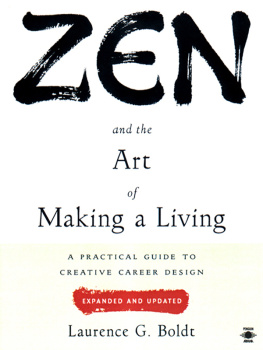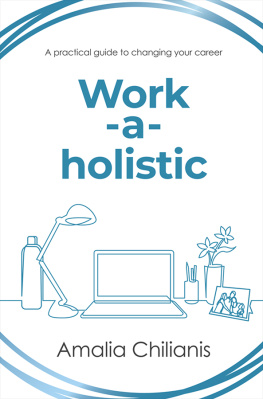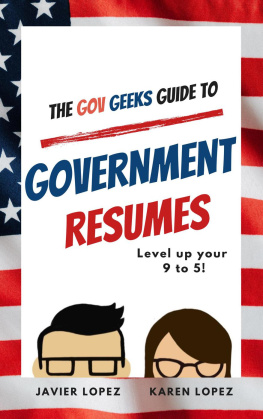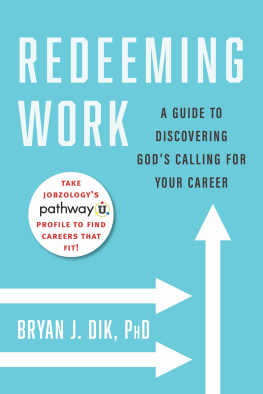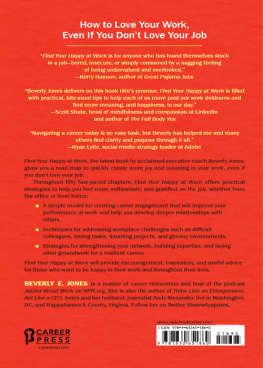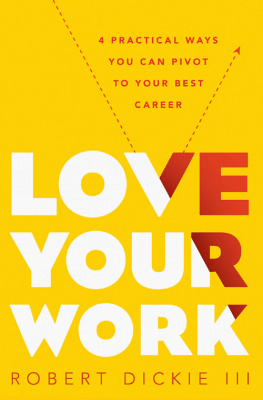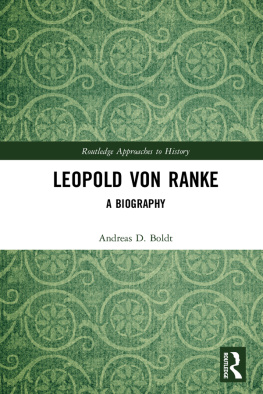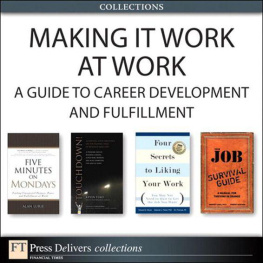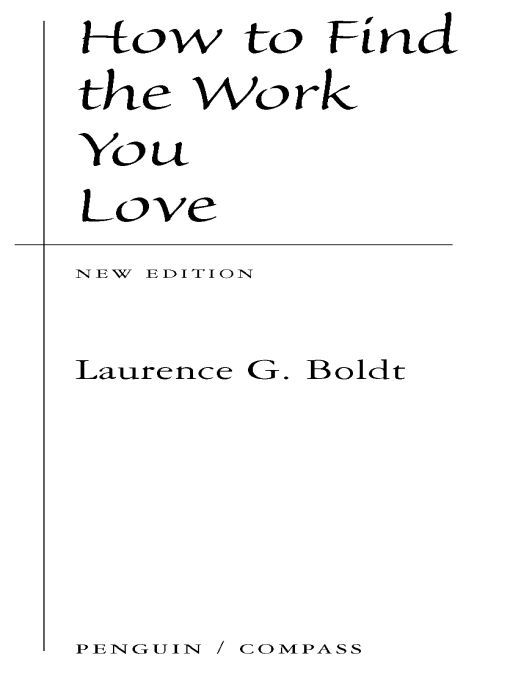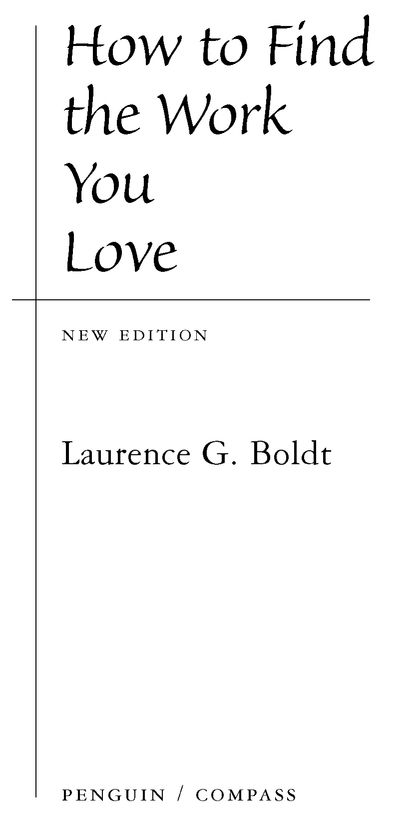Table of Contents
Laurence G. Boldt is a writer, speaker, and career consultant. He is the author of the bestselling career classic Zen and the Art of Making a Living, as well as Zen Soup and The Tao of Abundance.
To that unnameable something
which calls us all to be what we truly are.
PREFACE
I would like to take the opportunity of the publication of this new edition to share a few thoughts with my readers. First, I want to express my thanks to the many people who have written to me to share their experiences in working with this book. I am happy that through it, I have been able to play a part (however small) in your quests to find and do work you love. Your success stories have been truly inspiring. They reaffirm my own long-held belief in the power that creative passion has to energize and transform an individuals life. Over the years, I have seen this power at work countless times in the lives of people of all ages and from all walks of life. It is never too early or too late to take your life into your own hands and create what you want.
If I could say only one thing to those who have yet to find rewarding and exciting work, it would be this: Shake off your doubts and fearsdare to dream your dream and to live it. Fear scatters and squanders your energy. It paralyzes action and dizzies the mind, sending it hurtling off in a hundred directions that lead nowhere. You beat fear with desire, knowledge, planning, and constructive action. Stop for a moment and think about it: What separates you from doing the work you love? You can think of it as a series of problems to be solved or discoveries to be made. To do work you love, all you have to do is:
1. Figure out what kind of work you would love to do.
2. Figure out how to excel at doing it.
3. Figure out who needs and/or wants what you love to do.
4. Figure out how to convince them that you are the one to do it for them.
Now, obviously solving the first problem is the most important. From the standpoint of doing the work you love, figuring out how to excel at a given career or how to market yourself in it is meaningless without having first determined if you would really be happy doing that work. On the other hand, once you have effectively addressed the first problem, the remaining issues come into much sharper focus. Moreover, once you know what youd love to do, youll find the sustained motivation necessary to do what it takes to excel at it and to effectively market yourself. This book and the focusing questions in it will help you to engage the process of discovering your answers to the first of these issues. Ultimately, the best advice I can give you to solve this problem, or any of the others, is to decide in advance that you are going toand stay with it until you do. There has never been a better time to find the work you love.
ACKNOWLEDGMENTS
Much of the material in this book was first developed for How to Find the Work You Love seminars, which I began conducting across the country in the early 1990s. I would like to thank all those who attended for your feedback and enthusiastic response. It was a great joy and privilege to share in the energy and excitement that you generated at these events.
In addition, special thanks are due several people who helped to make this book possible. Thanks to Kim Grant for her editorial assistance and tenacious commitment to excellence, and for being there so many times when it really counted. Thanks to Tina Kolaas for her help in editing and for her inspirational support. Finally, many thanks to Susan Shapiro for assisting with the design and layout of the self-published edition.
INTRODUCTION
The Evolution of Creative Freedom at Work
The future belongs to those who believe in the beauty of their dreams.
Eleanor Roosevelt
YOU ARE IN THE right place at the right time. You picked up this book because you are interested in finding work you love. In its pages, you will encounter a process that has already helped thousands to realize their dreams of finding meaningful work that they truly enjoy. Later, I will have something to say about why this process has proved so successful. Yet, at the outset, I want to emphasize an essential point. When it comes to expressing yourself through exciting and fulfilling work, you are living in the best of all times. In all of human history, there have been only three fundamental revolutions in the world of work. The first came with the rise of civilization, the second with industrialization, and the third with globalization and the electronic revolution. Like the others, this third revolution has brought a certain amount of upheaval. But from the standpoint of the individual worker, it also has brought unprecedented opportunities. Indeed, though people have been yearning to pursue their creative passions for thousands of years, never before has the average man or woman had greater opportunities to discover and actualize work they love.
HUNTER-GATHERERS: JACKS AND JILLS OF ALL TRADES
Imagine that you had been born into a technologically primitive hunter-gatherer society. You would have had virtually no choice about the kind of work you would spend your life doing. Typically, the only form of specialization in these societies was a division of labor based on gender. All men were expected to do all of the mens tasks; all women, all of the womens tasks. While people in these societies often endowed their work with spiritual, aesthetic, and social meanings, as individuals they had virtually no choice as to the content of their work. This was determined by gender and by communal survival needs in relation to available local resources. Until the dawn of civilization, these two factors controlled the content of work for virtually everyone on earth.
Central questions framing choice of work:
What do men (in our group) do?
What do women do?
EARLY CIVILIZATION: HEREDITARY SPECIALIZATION
Civilizations arose with the advent of intensive agriculture capable of supporting large populations. For the first time, large groups of people began to devote their entire lives to tasks not directly related to survival. Though the activity of most people remained tied to food production, professional priests, warriors, government officials, merchants, and crafts-people of all types took their place in the life of the community. While there were now many more occupations than in the early period, there was still little career choice. Hierarchical class or caste systems prevented most people from changing occupations or improving their social position. In addition to environment and gender, the content of ones work was now largely determined by heredity. An accident of birth would determine whether you spent your life as a field hand or a winemaker, a tanner or a weaver. Though there were exceptions, the average person could expect to do with his or her life what his or her same-sex parent had done. Moreover, the increased specialization brought by civilization remained confined to relatively small areas. Around the globe, most people continued to engage in gender-defined work as subsistence farmers, herders, or hunter-gatherers. Regardless of where on earth you lived, had you been born prior to the Industrial Revolution, chances are you would have spent your life doing what your mother or father before you had donewithout giving it much thought.


